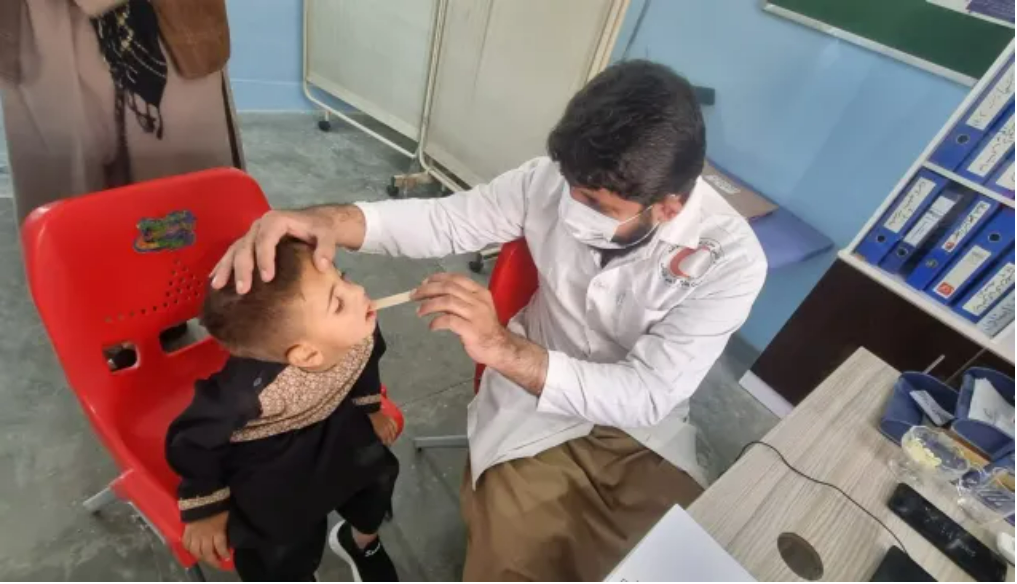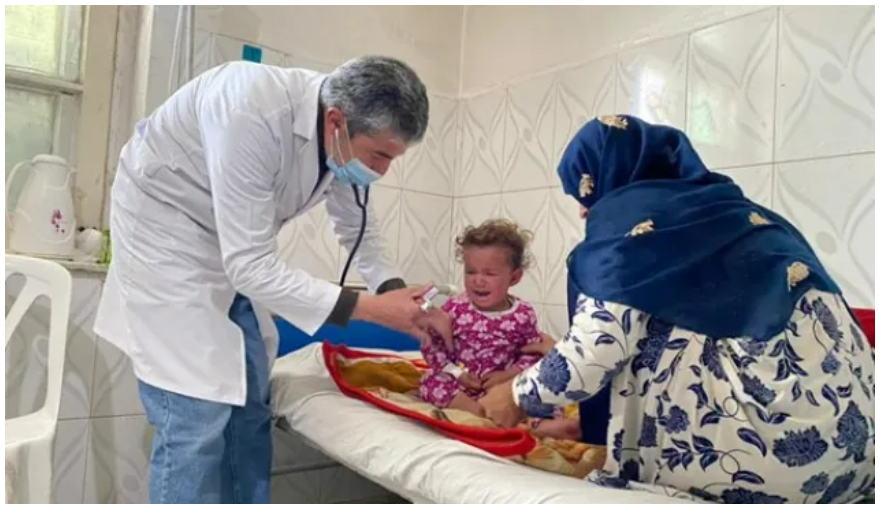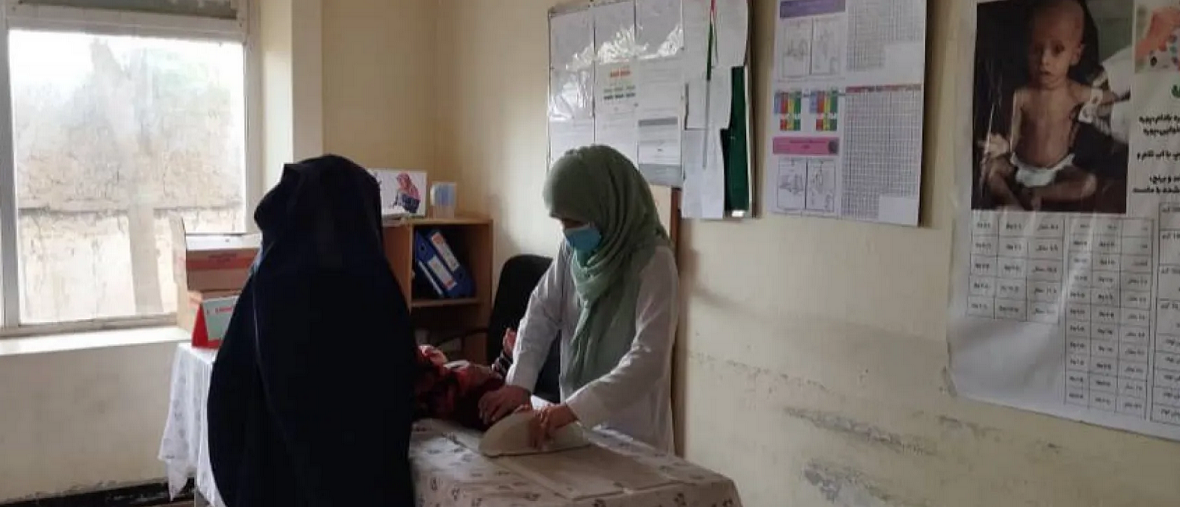The health needs of the Afghanistan population are provided mainly be the Ministry of Public Health (MoPH), with international support. The Afghan Red Cross Society (ARCS) also manages many health clinics to complement the MoPH effort, and 46 of their Basic Health Care (BHC) centres are supported by the ICRC.
Every year, these clinics provide access to common disease prevention and treatment to a million people, primarily focusing on women and children in rural areas. This has not only helped save lives but also relieved the pressure on the already overburdened secondary health-care system.
Hasina, a resident of Kandahar province, recently brought her four-year-old son, Khalid Ahmad, to the Basic Healthcare Centre to treat his sore throat.
“My son was bedridden with a fever and could not eat due to the pain. Thankfully, this centre is nearby, so we don’t have to travel far for medical assistance. We have been relying on this facility and the quality of health-care services, including the free medication, is good.”

Little Khalid Ahmad is being medically examined by a health physician in an Afghan Red Crescent Soceity (ARCS) Basic Health Centre in Kandahar
Comprehensive health care through coordination and cooperation
We cooperate with different International Red Cross and Red Crescent Movement partners to strengthen the capability of the BHCs to provide comprehensive health-care services. Some of our coordination and cooperation activities include:
- The Norwegian Red Cross plays a vital role by covering operational costs and supplying 60 per cent of the necessary medical supplies through the ICRC’s logistics system. We complement their efforts by providing the remaining 40 per cent of the medical supplies, funding salaries for 48 nutrition staff members and supplying essential nutrition products, medical equipment and other vital material.
- Additionally, we focus on increasing the technical capacity of ARCS health workers and improving the infrastructure to ensure these BHCs deliver high-quality care.
- By supporting a network of well-trained midwives, the ARCS, along with the ICRC, have ensured that women have better access for antenatal and postnatal care, obstetrics and gynecology consultations, treatments and referrals.
“The community-level impact of these efforts has been particularly evident in the increased consultations among women and children,” – Gail Corbett, health coordinator of the ICRC in Afghanistan.
Building capacity for long-term impact
Technical capacity building and training has a focus on enhancing the long-term impact of the services offered by these health centres. Our efforts include:
- Conducting training sessions on immunization, maternal-child health, mental health and psychosocial support, pharmacy administration, and leadership and management for the staff in the BHCs.
- Helping BHCs meet their nutrition aid requirements by effectively coordinating with other partners, including UNICEF and the WFP. To support any additional needs, we provide the BHCs with Ready-to-Use Therapeutic Food.
- Establishing a network of trained nutrition counsellors to provide consistent guidance, monitoring and support for at-risk individuals and communities. This network plays a critical role in increasing community outreach and awareness, and helps tackle malnutrition more effectively at the grassroots level.
These capacity-building initiatives are designed to enhance the skills, knowledge, and competencies of ARCS health staff, thereby ensuring that they can continue to deliver high-quality, professional health-care services to the Afghan population in areas served by BHCs.
Ensuring safety of medical workers
Safety of workers and patients remains a concern across Afghanistan and impacts health care delivery. To raise awareness on what respect of the medical mission entails, the ICRC facilitates awareness raising sessions with health workers and those who are known to disrespect health care delivery. The sessions are interactive and assist workers to understand better their role and responsibility to report or de-escalate potential incidents. They also hear how reporting of incidents and trends can support the ICRC and authorities to address the key issues they face in their daily work.
Despite the myriad of challenges, these health centres continue to support a steady flow of patients, demonstrating their importance in providing essential care to those most in need. In the first two quarters of 2024, a similar number of patients received care and consultations at the BHCs compared with the same period in 2023.

The chart shows comparative figures for male and female patients who received consultations at the 46 ARCS-run BHCs, between the first quarter of 2023 and the second quarter of 2024
The chart shows comparative figures for male and female patients who received consultations at the 46 ARCS-run BHCs, between the first quarter of 2023 and the second quarter of 2024
The vital role of the Primary Health Care programme
The Primary Health Care programme continues to be a top priority for ICRC and other Movement partners.
“This programme serves as a vital network of accessible, affordable, well-resourced health facilities for the population of Afghanistan, it plays a critical role in ensuring that local communities, particularly in remote areas, have access to essential health-care services.” – concludes Gail Corbett.

An Afghan Red Crescent Society (ARCS) doctor examines a patient at the Ghazi City Basic-Health-Care Centre
ICRC
Impact in Numbers: July 2023 – June 2024
- 1,055,876 patients, mostly women and children, received primary health care in 47 ARCS health facilities supported by the ICRC.
- 309,731 doses of routine vaccinations were administered at 46 ARCS-supported health facilities.
- 100,426 antenatal and 35,141 postnatal consultations provided.
- 79,168 clients were provided consultations for Family Planning services.
- 1,731 Gynaeco-obstetric complicated cases were detected and referred to secondary care (i.e. specialists).
- 241,931 children under the age of 5 were screened for malnutrition.
- 9,751 malnourished children benefited from the ARCS nutrition programme, supported by the ICRC, in 46 BHCs.
- 412 ARCS clinical staff received financial and technical support to attend various training sessions.
- Financial assistance was provided to the ARCS to cover the salaries of 46 ARCS nutrition nurses and 2 nutrition managers of the newly created ARCS nutrition unit.
The combined efforts of the ARCS, the ICRC and our other partners have made a difference in ensuring that life-saving health care reaches those who need it most, even in the face of adversity and numerous challenges.



Comments